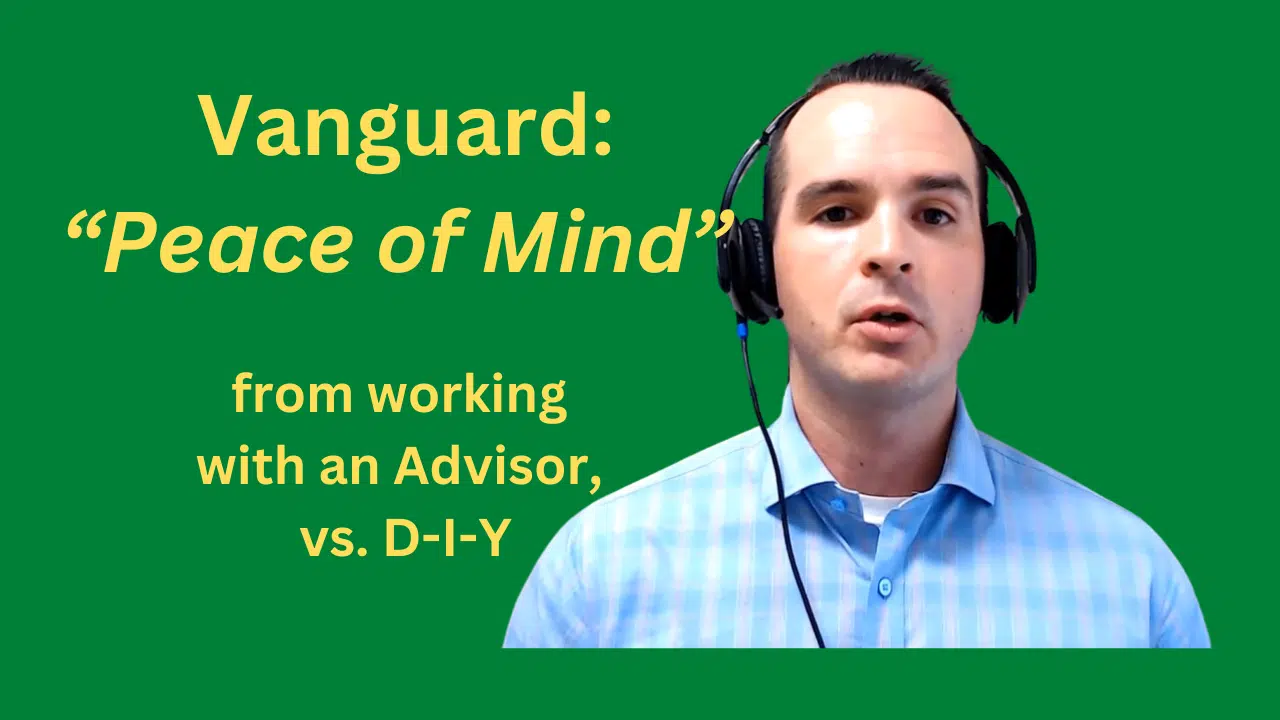Peace of Mind – working with an advisor: Vanguard
Key Takeaways from the “Peace of Mind” video:
- Vanguard: 88% of advised investors working with an advisor feel more peace of mind vs. do-it-yourself.
- Working with a financial advisor saves an average of 2.2 hours/week on financial tasks.
- “Finances” encompass everything: income, expenses, tax withholdings, savings, and retirement readiness.
- An advisor could act as your quarterback: coordinating with tax professionals, estate attorneys, and more for comprehensive planning.
- Offload complex decisions (IRMAA, Medicare premiums, market volatility) which could help you stay on track.
Timestamps
00:20 88% Report More Peace of Mind
00:50 “Finances” vs. “Investments” Explained
01:20 An Advisor’s Holistic Approach
01:50 Income, Expenses & Tax Withholdings
02:20 Time Savings per week
02:50 Offloading IRMAA & Medicare Planning
03:20 Handling Market Volatility
03:50 Retirement Readiness
04:20 Planning for Life Events
05:20 Your advisor as “Quarterback”
Peace of Mind – working with an advisor: Links
Catch all our Mullooly Asset videos here
Subscribe to the Mullooly Asset YouTube Channel
Watch this episode (“Peace of Mind – working with an advisor: Vanguard”) on our YouTube Channel
Click here for the Vanguard Survey and Report
Peace of Mind – working with an advisor: Transcript
88% of these investors said they feel more peace of mind.
Vanguard recently put out a research piece in an attempt to quantify the intangible aspects of working with a financial advisor. So the first survey question was, “compared to managing my finances on my own, having an advisor gives me…
– a lot less?
– less?
– neither more nor less?
– more?
– a lot more peace of mind?
And 88%. Of the over 12,000 respondents to the July, 2024 (2025) survey said that “working with a human advisor gives them more peace of mind than managing finances, managing their finances on their own.”
88%!
I also want to point out the use of the word “finances” there – and not just investments.
Because I think the overall landscape of the role of the investment advisor… and we’re certified financial planners here… the, the role is more evolving from just, investment management.
The Vanguard study did find that investment management is the most important aspect of the financial landscape that people are looking for help with.
Offloading the investment decision making, what to buy, when to buy, when to sell, um, that is an important piece of the puzzle.
But the word “finances” implies the whole picture.
And that’s certainly the approach that we take here. We want to get a look at the whole picture. Because we believe that the more comprehensive we can be, everything kind of feeds into each other.
And you can’t just invest in a vacuum if you don’t know anything about your client.
You know, as advisors, you need to know what’s going on in your client’s lives. What their goals are, you know, the detail, the finer details of their lives… so that you can invest in a prudent manner on their behalf.
So, you know, for us, that’s going to be looking at
income,
at expenses,
at tax withholdings,
where you’re saving,
what type of accounts you’re saving into,
whether or not you’re saving enough for retirement, if that’s your goal.
We want to look at your balance sheet,
your assets and liabilities,
and, depending on what your goals are, and kind of take things from there.
So, “finances” is not just investments.
Another stat from the Vanguard study: on average, American workers spend 7.7 hours – per week – thinking about, and dealing with financial issues.
Investors that work with advisors, in this Vanguard survey, again, 12,000 respondents to the survey reported spending 3.8 hours per week. With 78% of human advised clients report time savings of 2.2 hours per week.
So just to kind of give an example of this, let’s take Tom’s recent video on modified adjusted gross income.
You know, that’s just one of the many technical areas that we help clients dissect and implement in their lives. Do you really want to spend all the time researching and implementing the parameters to determine your IRMAA levels and determine how that’s going to affect your Medicare premiums?
Probably not.
Maybe, you know, you go online and search around and try and find a reputable source. Can you trust it?
Maybe, maybe not.
So that’s just, a small example of some of the work that you can offload to an advisor.
Also, if I had to venture a guess, I’d say that the time spent doesn’t equate a smooth 7.7 hours each week.
For most Americans, it probably “spikes” at certain areas, kind of waxes and wanes throughout a lifetime.
Some of the areas where it spikes – and people come to us looking for help, is during market volatility. A well-timed call to an advisor can stop you from making a drastic overreaction to what the market’s doing.
And those moves can often be devastating in the long term.
Maybe you’re thinking about retirement. You want to run the numbers and make sure you can do it. Make sure that you can make the jump into retirement. Or you want to know what your options are. You know… how many more years should you work?
How are you going to replace the tax withholding mechanisms on your W2 paycheck?
That’s something that a lot of people don’t think about.
What about Medicare?
How do we get you enrolled in that?
What about pre-Medicare health insurance? What about that?
A lot of things there with retirement, and that’s one of the bigger areas where we help folks with.
Job loss.
You’re probably spending a lot of time thinking about your finances when you’re going through a job transition.
Unfortunately when loved ones pass away and you have to figure out how to manage the finances. And how to figure out their estate and to meet the different requirements for different beneficiaries according to their last wishes.
That’s probably a time where you’re thinking – a lot – about finances, unfortunately.
Maybe you’re saving up, you want to pay for kids’ college? That can certainly, you can certainly invest a lot of time into figuring out how to do that.
So, you know, those are just some examples where we’re seeing people come to us, (where) they need help.
They’re stressed, they’re anxious, they’re spending a lot of time on this, and they just want someone to offload it to.
That’s why we’re here. So, like I said, the role of a good CFP, is to kind of “be the quarterback” between different professionals, whether it’s an estate planning attorney, tax professional, they can, we can, kind of help you be the translator there – while also managing their investments and helping you plan for your future.
So, yes, technical expertise is important.
Making sure you’re keeping up with the market is also off top of that list.
But when people come to us, the number one thing they’re looking for is peace of mind.
That they’re on the right track financially, no matter where they’re at in their life.
So, according to the numbers, again, 88% of advise clients report more peace of mind (working with an advisor).
If you’re working with an advisor, you can save 2.2 hours per week. That’s over a hundred hours per year!
What are you going to do with all that free time?
Think about it. Thanks for watching.








